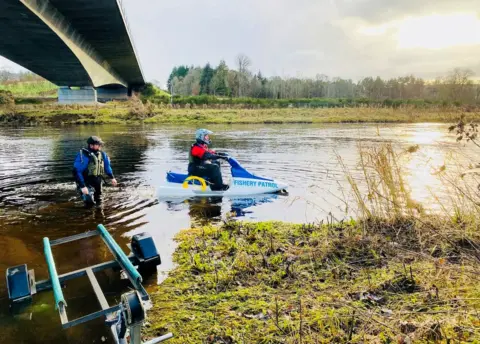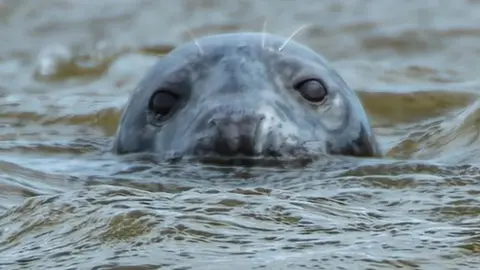Water scooter startle device used to deter seals from salmon
 BBC
BBCConcern has been expressed about acoustic startle technology being deployed on a water scooter in a bid to keep seals from salmon on a river.
The new method, aimed at protecting spawning salmon, is being trialled on the River Dee in Aberdeenshire.
The Dee District Salmon Fishery Board hopes it will help combat falling salmon numbers.
However, a group set up to safeguard seals said there were fears water scooters could panic the mammals.
Salmon stocks are in dramatic decline.
In the past 10-15 years catches on the River Dee have fallen by about two thirds.
Preserving precious salmon stocks means big business - fishing on the Dee brings in millions to the local economy ever year.
However balancing that income with the need to protect and preserve other wildlife on the river remains a challenge.
Since it is illegal to kill or injure a seal, fishery boards are trialling non-lethal methods.
 Erskine Logan
Erskine LoganJamie Urquhart, Dee District Salmon Fishery Board's protection manager, said the water scooter patrols carrying an acoustic deterrent device were an attempt to displace seals from the river.
"It emits a sound which is unpleasant to seals," he explained.
"Basically it deters seals and pushes them away from the noise. We slowly push the seal downstream and out of the river."
The device is set at a frequency which disturbs the seals but not the fish. It has been used on the Dee before, but was not previously attached to a water scooter.
At the Ythan Estuary in Newburgh, much has been done to protect the growing numbers of seals.
Lee Watson, from Ythan Seal Watch, said his concern was the use of a water scooter itself - rather than the static acoustic deterrent device.

"Acoustic deterrent devices have a history of research," he said.
However, he added "We have got a bit of concern with this being a new technique that's not been approved or agreed yet.
"Seals are mammals and have a beating heart, it's going to cause alarm and panic, and could cause injury.
"We support the protection of salmon, but there are many factors."
The fishery board insists it follows a protocol to ensure the seals are unharmed.

River director Dr Lorraine Hawkins stressed the water scooter itself was not the deterrent.
"It's simply the means of us getting the deterrent out towards the seal," she said.
"We've developed this method in consultation with the seal mammal research unit. They're the seal experts and they advise us on how we go about this, so we're confident there's no harm caused to the seal."
The project is being piloted on the Dee until April.
